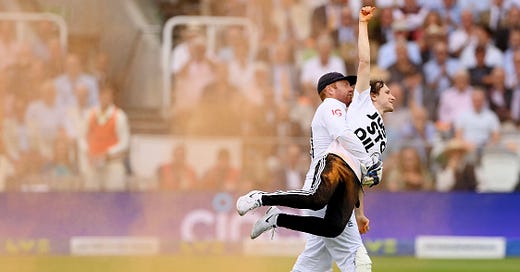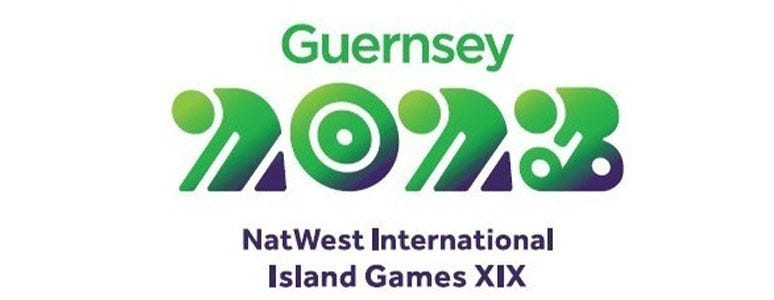Through the cloud of orange powder, I didn’t have a chance to check the privilege of the gurning protester hauled off the Lord’s pitch by Jonny Bairstow to see whether he is Type K. Turns out Daniel Knorr is an Oxbridge student, so it is a possibility. No idea though whether he ticks all the elitist boxes in the report of the Independent Commission for Equity in Cricket, published the day before the Test. Or whether he even likes the game; is perhaps a useful left arm trundler or middle order nurdler.
The ECB’s new-ish chair, Richard Thompson, looked pretty hollowed out to me as he responded to the ICEC’s report on its day of release. Hopefully it was just the studio lighting. He does though face a trio of headaches stretching over various horizons - enough to make anyone reach for the light switch and long for a lie down in a darkened room.
Short leg: the Ashes hopes of England’s men and women hang by slender threads in much-hyped series on home soil
Mid wicket: the previous leadership of the ECB has bequeathed him a long TV commitment to The Hundred - the competition that Thompson derided when chair at Surrey CCC but now seems commercially compelled to defend
Long off: the implementation of all or most of the ICEC’s recommendations, which will likely hollow out the ECB’s energy and, crucially, its finances
I’ve no personal stake in the current fight over cricket’s reputation, having knocked on the door of the establishment looking for a role a few times but to no avail - as Sport inc. readers may remember. I simply buy tickets to watch the game and have been giving some informal commercial advice to one of the first class counties.
And as I mentioned last week, I’m not Type K, so can’t be personally affronted by the societal stereotypes drawn by the ICEC. I feel decently placed then to observe that by claiming cricket is institutionally elitist - racist, sexist and classist - the ICEC is impugning innumerable people within the game. That, plus the hectoring tone of much of its 300-plus page report (which brooks no dissent), and its kitchen sink of recommendations, may prove counterproductive - emboldening defences rather than collaboratively dismantling them.
The ICEC creates five social ‘types’ in constructing a report that the ECB itself commissioned in response to the racism furore engulfing Yorkshire CCC.
Type K: White men, educated in private schools, who are straight and cisgender, and do not report a disability
Type L: men from non-White ethnic minority groups
Type M: women from non-White ethnic minority groups
Type N: White men
Type O: White women
Just five? Such broad, homogenous groupings? Are these generalisations a valid means of analysing a complex problem?
None of which is to deny that cricket has a problem - it very clearly does - but that such a blunt approach and conclusions from the Commission may prove a misfire.
A doubtless carefully-timed business profile of Richard Thompson last weekend made much of his having finished his formal education with a clutch of O Levels secured at a state school. Type N not K, then. But an establishment figure within cricket nonetheless, having been supported into his ECB post by almost all of the counties last autumn in the midst of the racism crisis. You can read the profile here.
I fear Thompson’s tenure, however many terms of office he eventually serves, will be subsumed by the aftershocks of the ICEC’s report. Its recommendations would take years to implement. Some are effectively outside the ECB’s direct control, in particular the diminishing provision of organised sport in state schools. Others need massive investment/subsidisation - the levelling up of rewards in the men’s and women’s professional games to the fore. Many require a re-engineering of the operation of the amateur game that could overwhelm volunteers who are already time-pressed (and quite possibly miffed at being unfairly labelled elitist).
At a raucous Oval last night for the second T20 of the women’s Ashes. 20,000+ through the gate. A best seat in the house for £33. Proving a strong product, well marketed, at (crucially) the right price, works. Tickets for today’s sold out Headingley men’s test range from £50 to £150
One parallel is Seb Coe’s first two terms as president of World Athletics. The former athlete has worked admirably to tackle governance and corruption failings in track & field. However, its product has marked time over the past eight years, losing ground to other sports while Coe has necessarily focused on structural and cultural reform.
The media has reported that one consultancy, Oakwell Sports Advisory, estimates the cost to the ECB of implementing the ICEC’s more expensive recommendations to be £15 million (apparently per annum). Add in all the other elements and the overall price of change is likely to be far higher.
Cricket in England is in hock to the revenue generated by the ECB from its men’s team - primarily broadcast income and sponsorship. Without it the infrastructure of the sport would collapse. The cost of reform at all levels of the game will ultimately have to be shouldered by that one sporting asset.
A cricket insider this week suggested to me that a silver-lining from the publication of the report is that Richard Thompson will now be able to clear the stables at the ECB. But redundancy programmes in any industry are typically expensive, as are replacement recruitment drives. And the governing body will need to add specialist staff to implement an effective equality programme across cricket. Don’t expect much reduction, if any, in its overall headcount.
The ECB had reserves of £35 million at 31st January 2023. Pretty good cover for a rainy day, but right now Richard Thompson and team are stranded in the middle of the wicket in a monsoon without a brumbrella. Establishment figure or not, he needs and deserves help from all quarters, and certainly all five ‘types’.
Va Va Voom
My man in the box office says the Drive to Survive effect is real. Over a third of ticket buyers for this weekend’s F1 Grand Prix at Silverstone I’m told are women - more than double the pre-Netflix series proportion. Many presumably are new to F1. And a key reason why it sold out so quickly this time.
Every man is an island
The Island Games start on Guernsey on Saturday. 24 islands from Åland to Ynys Mon are competing in 14 sports. Kudos to the organisers for managing to squeeze over 2,000 athletes plus hundreds more team staff, supporters, officials and journalists onto an island with a population of just 55,000. If you can make it, events are free and unticketed. But you’ll likely struggle to find a bed. All the info you need is here.






When I googled the phrase "cricket in the united states" this article is one of the first
to come up. That's very telling and here is one of the most significant quotes therein:
https://www.cricketworld.com/why-has-cricket-never-really-taken-off-in-the-us-/80738.htm
"One of the major reasons why cricket has never really taken off in the United States is because of the rise of baseball. If we go back to the mid-19th century, cricket was one of the most popular sports in America, but the expansion of baseball came at the expense of cricket. "
Yesterday witnessed an exciting milestone in the Little League Baseball World Series. For the first time in the 76-year history of LLBWS a team
from Cuba competed against other 10 to 12-year-olds from across the globe. Latin American countries like Dominican Republic, Venezuela, Panama, Mexico and Cuba are hotbeds of baseball talent. This latest development gives hope to the possibility that one day Cuban athletes
may be able to play on American professional teams while spending the off-season in their home country instead of having to defect in order to
play in the MLB.
https://apnews.com/article/little-league-cuba-japan-f9c44d56cc588ddd2fa8827b4d6795ff